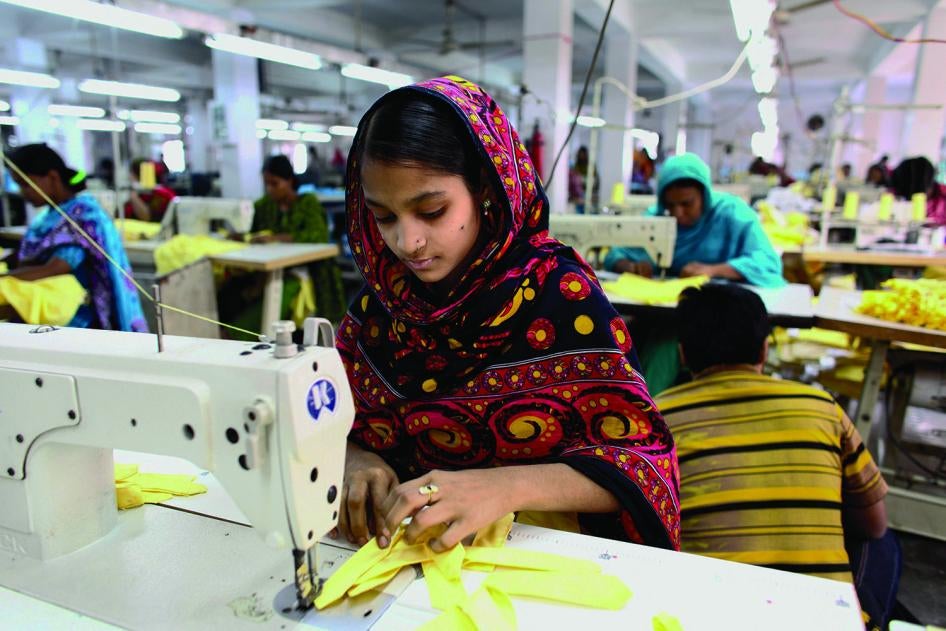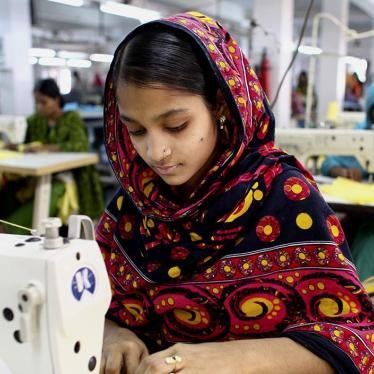Germany has a growing club of global apparel brands making their supplier factory information public. Unfortunately, KiK is dragging its feet on transparency, and has stayed out of the club.
Transparency in the garment industry about the factories brands use to produce their clothes is important. When apparel brands publish names and key information about their supplier factories, it allows workers and labor advocates to swiftly alert them to unsafe working conditions or labor rights violations. This kind of transparency can even help avert deadly disasters.
Many apparel brands understand this. Since October 2016, a coalition of nine global labor rights groups and unions, including Human Rights Watch, have been advocating for a basic minimum level of supply chain transparency (known as the Transparency Pledge) in the apparel sector.
The global coalition wrote to leading brands that were members of the German Partnership for Sustainable Textiles, inviting them to publish their supply chain information, aligning with the Pledge. The Textile Partnership involves various entities concerned about the issue, including the German federal government, apparel and footwear companies, nongovernmental organizations, and trade unions. It enables brand members to develop a roadmap of what they want to achieve annually, and to report progress.
When it comes to supply chain transparency, KiK is the odd one out. All other Textile Partnership brands we wrote to gave us a positive response. ALDI South, ALDI North, Lidl, Hugo Boss, and Tchibo shifted their position and began publishing their supplier factory information for the first time in 2017. Adidas, C&A, Esprit, and H&M—companies that were already publishing the information—made commitments to fully align their disclosure practices with the pledge. Puma too agreed to publish more details about factories than they were already doing. These companies have proven through their action that they suffer no competitive disadvantage from publishing this information.
In a letter from KiK to Human Rights Watch, the company said: “KiK is an active member of the German Partnership for Sustainable Textiles. We have committed ourselves to fully supporting its goals and objectives. The question of disclosing global supplier lists is currently being discussed in the Textile Partnership. Mandated NGO representatives are part of that discussion. For the time being, however, a binding decision has not been taken.”
Brands have complete freedom to adopt good industry practices if they want to, and don’t need to wait for Textile Partnership’s decisions. In fact, the German Textile Partnership’s Guidelines for Creating Roadmap for 2017 clarify to its members that “[g]oals can also freely be formulated … provided they are related to the key question and the indicators.” In fact, other brands that are members of the Partnership published supplier factory information on their websites.
Using the Partnership to justify its poor decisions not only gives KiK a bad name, but also risks tarnishing the reputation of the Textile Partnership. KiK should drop its excuses, and simply go transparent.
In 2012, a fire ripped through one of KiK’s supplier factories in Pakistan, killing 255 workers and injuring 57. Last year, KiK agreed on a compensation package of more than US$5 million for victims. Paying compensation after a disaster is important and it’s commendable that an agreement was reached. But it’s equally important for companies to do everything in their capacity to make sure that any problems in the factories they source from come to light before they lead to disaster. The best way to make that possible is to make sure workers, consumers and the public at large can find out what brands any given factory is producing. Without that knowledge, brands may not get word of workplace abuses, safety issues and other problems until it’s too late.
If an apparel company stands for workers’ rights, there are no two ways about supply chain transparency. KiK should go transparent and join forces with other German Partnership brands that have already done so, and collectively demand that such transparency be made a mandatory part of brand members’ roadmaps.









